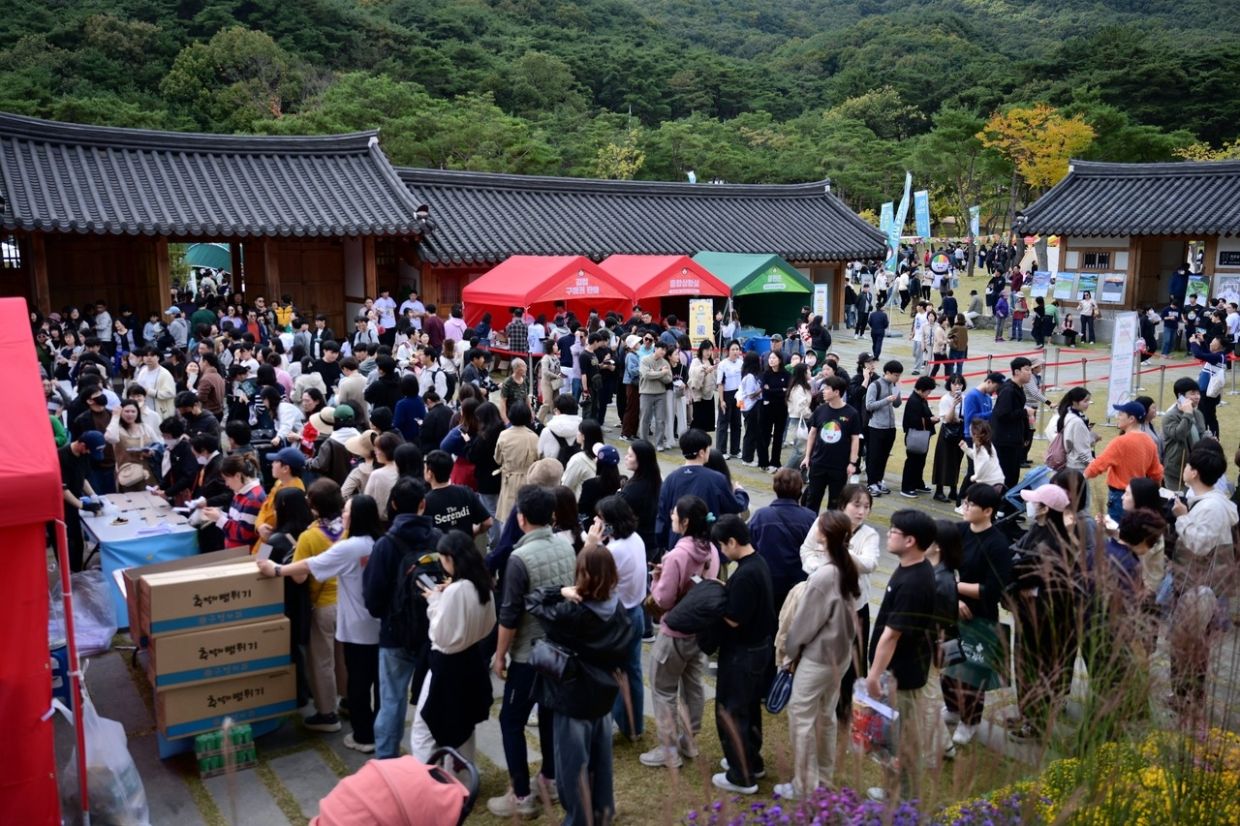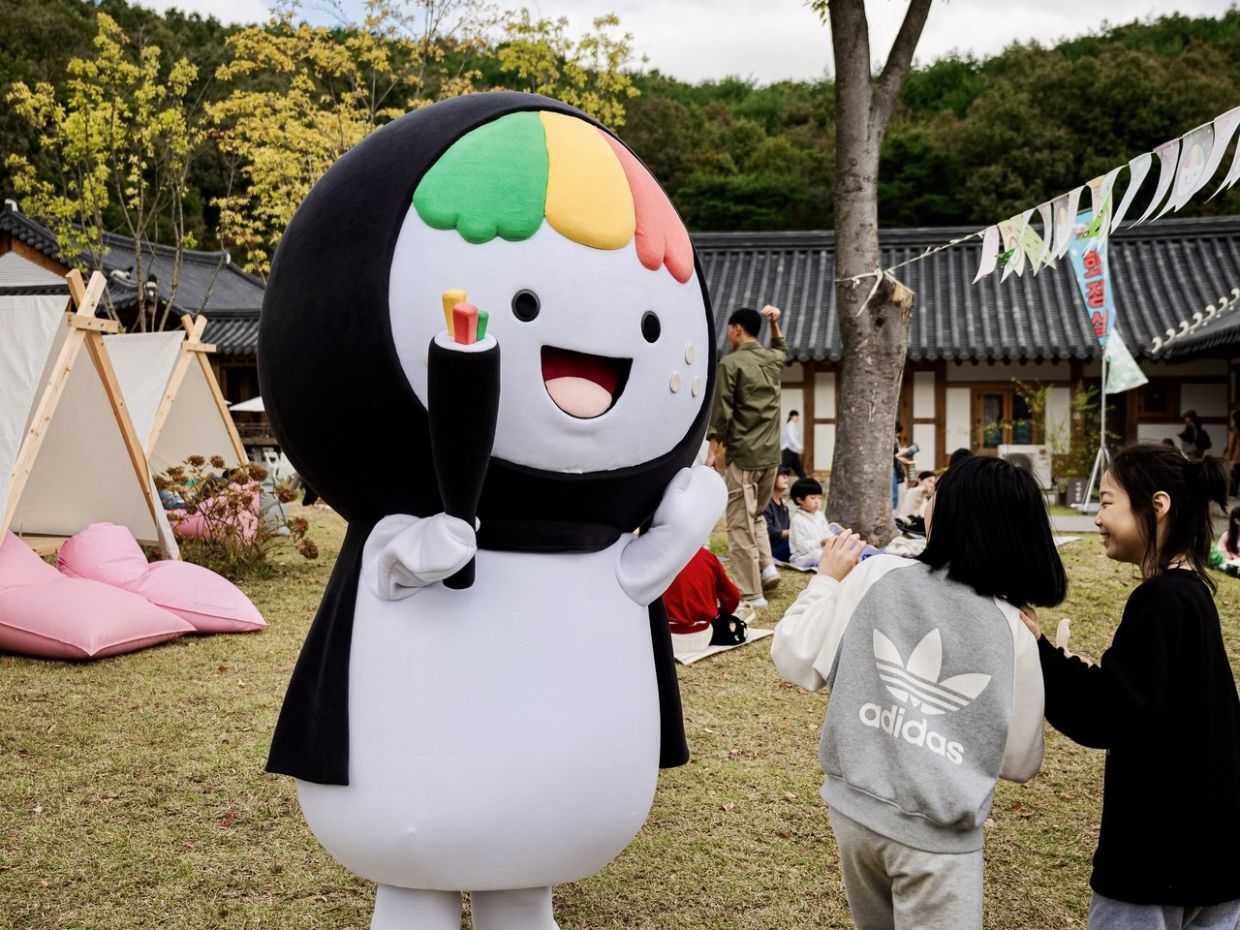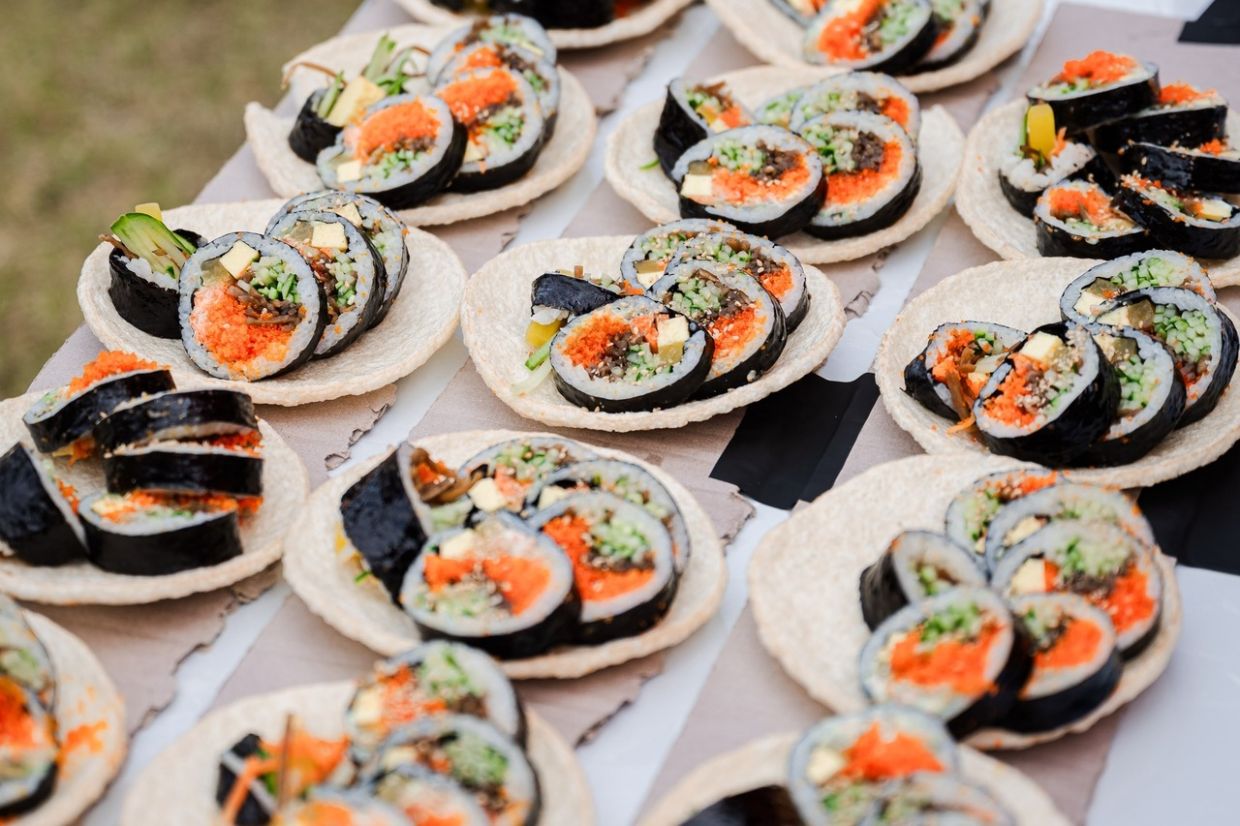SEOUL: Gimbap (also spelled kimbap) is everywhere in Korea. You can find it sliced or unsliced, vegan or spicy, packed fresh or frozen, all for as little as a couple bucks. Every convenience store has it and every city eats it.
So would it really make sense for anyone to travel over three hours from Seoul to a random city just to eat it?
Tens of thousands already did last year.
Now, with the second Gimcheon Gimbap Festival set to return on Oct 25 and 26, and gimbap riding a wave of global pop cultural visibility on the tails of Netflix hit “KPop Demon Hunters,” the question has become a pressing one.
For the small city of Gimcheon in North Gyeongsang Province, the possibility of foreign visitors has introduced a new kind of pressure.
 Visitors wait in long lines at the inaugural Gimcheon Gimbap Festival in October 2024, where limited-edition gimbap tickets and eco-friendly packaging drew early crowds well before noon. – Gimcheon
Visitors wait in long lines at the inaugural Gimcheon Gimbap Festival in October 2024, where limited-edition gimbap tickets and eco-friendly packaging drew early crowds well before noon. – Gimcheon
“We’re preparing as if foreigners might come,” said Ahn Yoo-hee, a junior officer in the city’s tourism marketing team managing this year’s logistics.
“But we honestly have no idea if they will. And if too many do? That’s a different kind of problem.”
The uncertainty reflects both the unusual origins of the festival and the unlikely scale of its success in its first year.
Launched in October last year with modest expectations, the inaugural Gimcheon Gimbap Festival drew more than 100,000 people across two days, more than five times the city’s forecast. The city’s entire population is about 130,000.
By early afternoon on the first day, traffic was at a standstill, food vendors had run out of ingredients and long lines formed for the few remaining booths.
The surprise turnout stemmed not from traditional tourism infrastructure or major celebrity performances, but from a viral campaign anchored in irony.
 Kkodari, the gimbap mascot of Gimcheon, North Gyeongsang Province, greets visitors at the 2024 Gimcheon Gimbap Festival that has unexpectedly gone viral. Dressed as the “tail end” of a gimbap roll, the character embodies the festival’s cheeky rebrand of local identity through food and fun. – Photo: Gimcheon
Kkodari, the gimbap mascot of Gimcheon, North Gyeongsang Province, greets visitors at the 2024 Gimcheon Gimbap Festival that has unexpectedly gone viral. Dressed as the “tail end” of a gimbap roll, the character embodies the festival’s cheeky rebrand of local identity through food and fun. – Photo: Gimcheon
In a late 2023 Instagram survey conducted by the city, the most common association respondents had with “Gimcheon” was not its local produce or historic temples.
It was known as a shortened phrase for ubiquitous budget restaurant chain Gimbap Cheonguk, whose name translates to “Gimbap Heaven.”
Many, especially younger Koreans active on social media, did not even realise Gimcheon was an actual place.
Instead of trying to correct the perception, the city decided to play along.
For a small city facing population decline and struggling for national recognition, the lack of widespread knowledge itself became an unlikely opportunity.
“We couldn’t expect people to care about a city they didn’t even know existed,” said Park Bo-hye, a former junior municipal employee in her 20s who played a key role in the festival’s creation.
“So we thought: Let’s start with something they do recognise, even if it’s a misunderstanding.” Park has since been promoted and now works in a different city.
That decision became the foundation of the city’s first gimbap-themed festival. With a budget of just 150 million won ($107,000) — about a tenth of similar regional festivals — Gimcheon’s tourism team developed a campaign tailored for online attention.
Park sketched out the original version of Kkodari, a cartoon mascot based on the end piece of a gimbap roll, and helped write the caption copy for the city’s Instagram account.
A quirky music video uploaded to YouTube featured Kkodari cheerfully rapping: “Busan is gukbap, Jeonju is bibimbap, so what about us? Gimcheon is gimbap now.”
While the video itself received tens of thousands of views, the real acceleration came when one of the city’s Instagram card-news posts was picked up on X, where it topped the trending chart for several days.
National media outlets followed with coverage, and interest surged.
“No one expected this little festival to go this viral,” Park said. “We just tried something small, and it worked.”
The city had not anticipated the massive attendance, but the results were hard to ignore. The festival became a case study in low-capital, high-resonance marketing.
Compared to other regional food festivals, like Gwangju’s long-established kimchi festival, which attracted 68,000 visitors over three days in 2024, Gimcheon’s debut drew more visitors despite lacking an actual culinary legacy.
Gimcheon has no historical connection to gimbap. Its local specialty is plums.
There are no large-scale gimbap producers or factory brands based in the area. The festival’s thematic link to the dish was constructed entirely through public misassociation.
This year, that association has only intensified.
Since July, interest in gimbap has grown internationally following the release of “KPop Demon Hunters” on Netflix, which became a global streaming success.
In one scene protagonist Rumi eats an entire uncut roll of gimbap in a single bite, which triggered a viral TikTok challenge and boosted global demand for the dish. Korean convenience stores launched tie-in products, as gimbap-related hashtags reached hundreds of millions of views across platforms.
City officials acknowledge the effect, but say they had no time to redesign the festival for an international audience.
Planning for the 2025 event began in early January, before the film’s release. No English-language marketing was produced, although Gimcheon has recruited multilingual volunteers and is preparing English signage and guides for the event site.
Ahn noted that while the city expects approximately 70,000 to 80,000 attendees this year, there is no estimate for how many might be coming from abroad.
“We thought we were just making something fun for locals,” Ahn said.
“Now there’s a chance someone might fly halfway around the world for it. I am not sure how to describe it. We are both worried and animated.” – The Korea Herald/ANN
